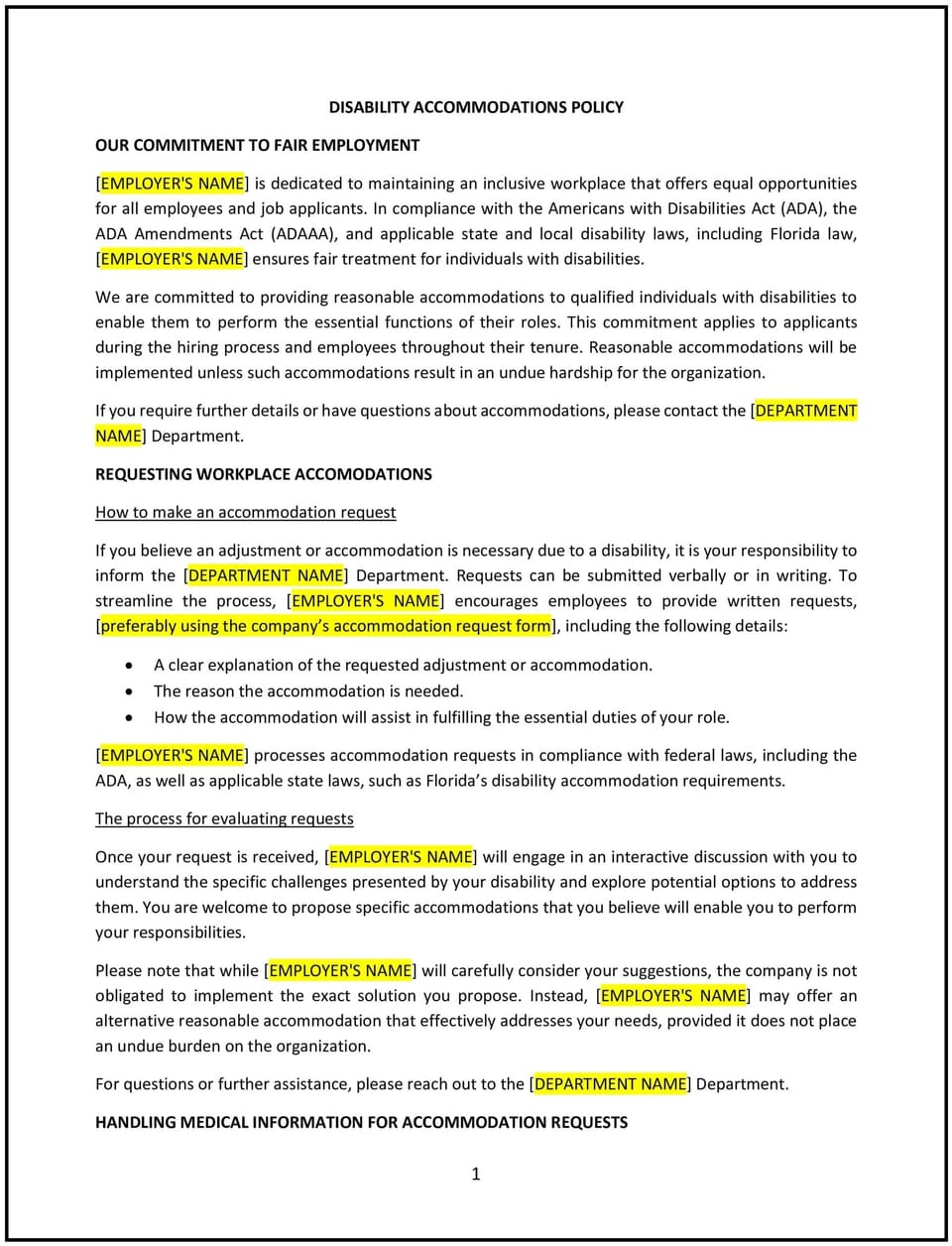Disability accommodations policy (Florida): Free template

Disability accommodations policy (Florida)
A disability accommodations policy helps Florida businesses create an inclusive workplace by providing reasonable adjustments for employees with disabilities. This policy outlines procedures for requesting, evaluating, and implementing accommodations to support employees in performing their job duties effectively. It is designed to promote accessibility, reduce barriers, and provide clear guidelines for fostering a supportive and equitable work environment.
By implementing this policy, businesses in Florida can demonstrate their commitment to inclusivity, enhance employee satisfaction, and align with the state’s focus on diversity and equal opportunity.
How to use this disability accommodations policy (Florida)
- Define reasonable accommodations: Clearly specify what constitutes reasonable adjustments, such as ergonomic equipment, flexible schedules, or assistive technology.
- Establish request procedures: Outline how employees should submit accommodation requests, including required documentation and timelines.
- Evaluate needs: Explain how businesses should assess requests to determine appropriate accommodations based on job requirements and individual needs.
- Address implementation: Provide guidance on how accommodations will be provided, including timelines and responsibilities for installation or setup.
- Communicate the policy: Share the policy with employees during onboarding and through regular communications to ensure awareness and understanding.
- Monitor adherence: Regularly review how accommodations are implemented and address any concerns or discrepancies promptly.
- Update the policy: Periodically assess the policy to reflect changes in workplace dynamics, employee needs, or business goals.
Benefits of using this disability accommodations policy (Florida)
This policy offers several advantages for Florida businesses:
- Promotes inclusivity: Supporting employees with disabilities fosters a diverse and welcoming workplace culture.
- Reduces barriers: Providing accommodations helps employees perform their roles effectively, improving productivity and morale.
- Builds trust: A clear policy demonstrates the business’s commitment to fairness and respect for all employees.
- Aligns with community values: Reflects Florida’s emphasis on diversity, accessibility, and mutual support.
- Enhances reputation: Demonstrates the business’s dedication to ethical practices and employee well-being.
- Improves retention: Offering accommodations contributes to higher employee satisfaction and loyalty.
- Supports legal alignment: Helps businesses stay informed about state-specific expectations for workplace accessibility.
Tips for using this disability accommodations policy (Florida)
- Communicate clearly: Ensure employees understand the policy by providing written materials and discussing it during meetings or training sessions.
- Train managers: Educate supervisors on how to handle accommodation requests sensitively and consistently.
- Be flexible: Allow for reasonable adjustments based on individual needs and job requirements to ensure effectiveness.
- Track requests: Maintain records of accommodation requests and approvals to monitor trends and ensure fairness.
- Stay informed: Keep up with changes in societal norms, workplace expectations, or state-specific guidelines that may affect accommodations.
- Encourage feedback: Solicit input from employees to identify areas for improvement and ensure the policy meets their needs.
- Review periodically: Assess the policy’s effectiveness and make updates as needed to reflect changes in workplace dynamics or business goals.
Q: Why should Florida businesses adopt a disability accommodations policy?
A: Businesses should adopt this policy to promote inclusivity, reduce barriers, and demonstrate their commitment to supporting employees with disabilities.
Q: What types of accommodations should businesses consider?
A: Businesses should consider accommodations such as ergonomic office equipment, flexible work schedules, assistive technology, or modified workspaces based on individual needs.
Q: How should businesses evaluate accommodation requests?
A: Businesses should assess requests based on job requirements, employee needs, and feasibility, consulting with the employee and relevant experts if necessary.
Q: What documentation should businesses require for accommodation requests?
A: Businesses should request reasonable documentation, such as medical certifications or assessments, to verify the need for accommodations while respecting privacy.
Q: How should businesses handle requests that are not feasible?
A: Businesses should engage in an interactive process with the employee to explore alternative solutions that meet their needs without compromising operational requirements.
Q: Should businesses provide accommodations for temporary disabilities?
A: Businesses should consider temporary accommodations for short-term disabilities, ensuring employees can return to full productivity as soon as possible.
Q: How often should businesses review the policy?
A: Businesses should review the policy annually or whenever there are significant changes in workplace dynamics, employee needs, or business operations.
This article contains general legal information and does not contain legal advice. Cobrief is not a law firm or a substitute for an attorney or law firm. The law is complex and changes often. For legal advice, please ask a lawyer.


